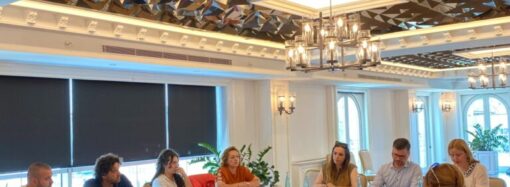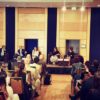On 30 June 2022 was held the discussion table on Money laundering t – requirements set to Albania in the fight against organised crime. This activity took place in the framework of the Partnership Platform for European Integration (PPEI), the Table for Chapter 24 and the National Convention for European Integration 2021-2023, organized by the Ministry of the Interior and the European Movement Albania. In the activity participated representatives from the line state institutions such as: the Ministry of Internal Affairs and the State Policy, representations of diplomatic missions, the sector of civil society and universities. The activity took place in the hybrid format with physical participation at Xheko Imperial Hotel and online on the ZOOM platform.
The meeting was opened by Besfort Lamallari, Deputy Minister of Interior of Albania, who thanked the members of the table for their participation and said that this meeting cannot be seen as detached from the process of European Integration. Further, Lamallari highlighted that the Western Balkans is a region in development and Albania has already met the conditions for opening of the negotiations. It has been re by the European Commission and recently such a similar conclusion was made by the State Committee for the European Integration (SCEI). This declaration deals with many issues, mainly highlighting Chapter 24. Albania is determined to continue the fight against corruption and has extended the cooperation with EuroJust. Lamallari during his speech added that Albania already has 14 teams of joint investigations with EuroJust and soon it is expected that 3 more teams to be established. At the end of his speech, he said that meetings, such as today’s, are with much interest, in order to have the necessary attention to the European Integration process.
Gledis Gjipali, Executive Director of European Movement Albania (EMA), said that the tables of Partnership Platform are very important because they establish the consultation between state institutions and civil society, academia, other groups of interest and media etc. He also brought into attention the importance that these tables will have , especially after the opening of negotiations for Albania.
Suela Jahaj, Director in the Directory of Integration, Agreements, Coordination and Assistance, Ministry of Interior, spoke about the main policy areas of Chapter 24 and the institutional structure that covers this chapter’s fields. Due too many topics that this Chapter includes, it has been divided into four subgroups, such as: regular and irregular migration, asylum and visa policy; the war against the organized crime; the war against terrorism; also the judicial cooperation in civil and criminal cases. During her speech, she highlighted the recommendations given by the European Union, where she introduced the participants with the recommendation for the approval and implementation of rules on assets. Regarding this recommendation, Jahaj said that Albania under the fight against corruption has ratified and implemented the Convention of Vienna, Palermo, Warsaw and United States, as part of our internal legislation. During her speech she gave recommendations for improving the process, such as: better institutional cooperation; e special people dedicated to the above mentioned issues in the institutions who would be dedicated for reporting of special issues of the chapters; she also suggested the increasing of capacities, as well as increasing of trainings for new members and staff.
Lutfi Minxhozi, Director of Economic and Financial Crime, Albanian State Police, focused his presentation on the Albanian legislation under the fight against money laundering. Albania has a special law for money laundering, which is adopted in accordance with the 40 recommendations and directives issued by the European Union. Albania also has established a legal committee, which is headed by the Prime Minister and where the institutions report weekly on the implementation of the directives. In continuation of his speech, Minxhozi said that an issue with much interest is the third report of the presentation of the measures, which had a positive evaluation, however, Albania has been left again in the monitoring process due to the need for efficacy of investigations. The international group has made an in-depth study of local and international legislation, as well as have been analysed and compared the experiences of other countries in the region. According to him, the best way to fight organised crime and corruption is to capture and confiscate the assets of criminals.
The word was taken by Andrej Leontiev, Lawyer and Co-head of Bratislava office, who analysed the fifth EU Directive of Money Laundering and the implementation of this directive. According to Leontiev, works of art are simple objects to move, and they also have a big value. Leontiev did not hesitate to bring examples of thefts from other countries of the region. Further, during his word he introduced the participants with two very important documents, such as: ‘Basel Institute on Governance’ and ‘Gatekeepers Framework’, in the drafting of the second document Leontiev himself participated. According to him, the dirty money cannot be used without offering of services by professionals such as: attorneys,, banks, evaluators of art etc. Further, he underlined how the implementation of this directive is going in Slovakia,. According to him, Slovakia similar to Albania had an issue when it comes to the money laundering, while Slovakia has been part of many scandals by passing large sums of money. During his speech, he did not hesitate to bring the lessons learned from Slovakia and also introduced the participants to the procedures followed in Slovakia for the registration of assets and companies. Furthermore, he added that in Slovakia, the verification of assets has 5 stages and Slovakia has spent more than 5 million Euros for the verification of these data.
It was with interest from the participants to know the Leontiev’s opinion on the increase of capacities in Albania, as well as to learn more about the document, in the drafting of which the Slovak expert himself had participated. The participants were also interested in learning about the Slovak experience in the fight against corruption. Migration was a topic proposed by the participants as a topic that could have much interest for future tables.



















